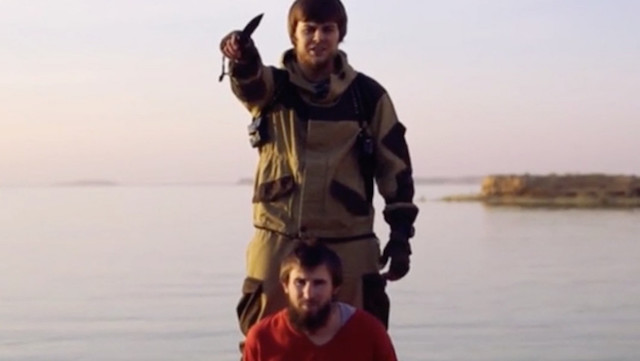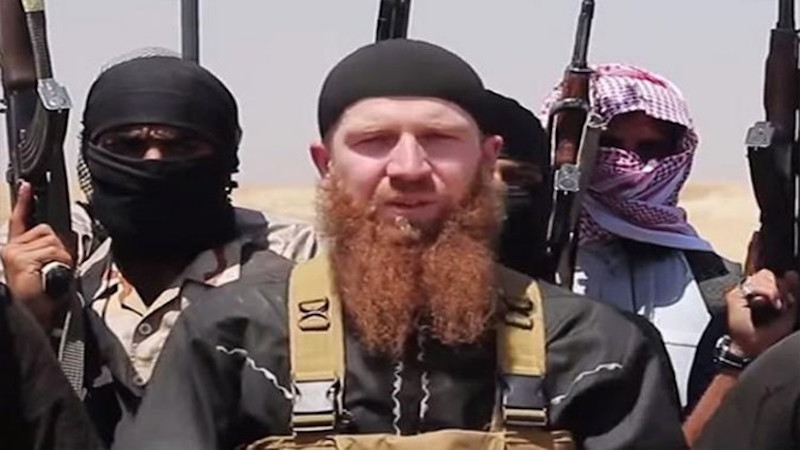Hol Dir den wöchentlichen SPARTANAT-Newsletter.
Dein Bonus: das gratis E-Book von SPARTANAT.

Tschetschenen im Dschihad
Die tschetschenischen Dschihadisten haben im letzten Jahrzehnt einen annähernd legendären Status als Kämpfer erhalten. „Tschetschene“ wurde zum Synonym für „militärisch kompetenter Dschihadist”. Jedes Mal, wenn Koalitionskräfte auf dem Schlachtfeld auf Dschihadisten stießen, die Feuer und Bewegung beherrschten, wurden sie als „Tschetschenen“ gesehen. Im Jahr 2005 wurden im Irak alle effektiven Scharfschützen der Aufständischen als Tschetschenen bezeichnet.
Trotz dieser Mythologisierung (bis ein realer Heckenschütze erwischt wurde, gab es nichts als Gerüchte, dass es ein Tschetschene sein müsse) muss nicht darüber diskutiert werden, dass der tschetschenische Dschihad den „Heiligen Krieg“ als Ganzes geprägt hat, besonders jenen der sunnitischen Salafisten. Sichtbarster Ausdruck dafür ist im Moment zum Beispiel Abu Omar al Schischani (Bild unten), einer der Feldkommandanten des Islamischen Staates.
 Geboren in Tarchan Batiraschwili, gelangte al Schischani im Verlauf des syrischen Bürgerkriegs zu Prominenz weil er in einigen IS Videos auftauchte, die sowohl den Kampf gegen das Assad Regime wie auch gegen andere, rivalisierende Rebellengruppen dokumentierten. Laut Berichten wurde er mindestens drei Mal im letzten Jahr getötet, er überlebt weiter und taucht immer wieder auf, zuletzt in der irakischen Provinz Anbar, und Rudaw berichtete, dass er den Sturm auf Kobane anführen soll.
Geboren in Tarchan Batiraschwili, gelangte al Schischani im Verlauf des syrischen Bürgerkriegs zu Prominenz weil er in einigen IS Videos auftauchte, die sowohl den Kampf gegen das Assad Regime wie auch gegen andere, rivalisierende Rebellengruppen dokumentierten. Laut Berichten wurde er mindestens drei Mal im letzten Jahr getötet, er überlebt weiter und taucht immer wieder auf, zuletzt in der irakischen Provinz Anbar, und Rudaw berichtete, dass er den Sturm auf Kobane anführen soll.
Al Schischani hat sein erstes Gefecht allemal nicht in Syrien erlebt. Geboren im Pankisi Tal, trat er in die georgische Armee ein und diente währen des russisch-georgischen Krieges 2008 in einer Aufklärungseinheit. Sein ehemaliger Kommandant beschreibt ihn als sehr zuverlässig im Felde und er wurde zum Unteroffizier befördert, bevor er 2010 aus gesundheitlichen Gründen (er hatte Tuberkulose) aus der Arme ausschied.
Al Schischani (was übrigens nichts anderes als „Der Tschetschene” heißt) selbst ist nicht gegen die Russen in Tschetschenien zum Einsatz gekommen. Aber er ist eben nur der letzte einer ganzen Reihe von tschetschenischen Kämpfern, die bis auf den russisch-tschetschenischen Krieg von 1994 zurückgehen. Der ursprüngliche Krieg dauerte nur von 1994 bis zum Rückzug der Russen 1996, aber bis dahin hatten sich die Islamisten bereits tief in der Bevölkerung verwurzelt. Und der Guerrillakrieg bis 1999 produzierte noch mehr Veteranen.
Die Masse der tschetschenischen Bevölkerung war zwar immer muslimisch, allerdings traditionell Sufi, also Anhänger einer islamischen Sekte. Diese wurde von anderen Muslimen immer wieder verfolgt, weil der Sufismus die politische und die religiöse Sphäre getrennt hält. Die tschetschenische Bevölkerung vor 1994 war nicht sonderlich empfänglich für die Predigten des Dschihad, wie sie von sunnitischen Salafisten vorgetragen wurden. Die seperatistische Bewegung, die von Dschochar Dudajew angeführt wurde, war rein nationalistisch; sie hatte kein religiöses Element involviert. Erst als der arabische Al Qaida Kämpfer Ibn al-Chattab (Bild unten) und seine Unterstützer auftauchten, wandelte sich der Tschetschenienkrieg in einen religiösen.
Was sich dann in Tschetschenien ereignete, war die Kooptierung einer nationalistischen Bewegung durch eine transnational-ideologische Bewegung. Die Tatsache, dass Tschetschenen Muslimen waren, war den tschetschenischen Nationalisten selbst eine Nebensache, aber es war das Einfallstor, durch das sich Al Qaida Zutritt verschaffte. Die Tschetschenen dagegen fanden die fremden Mudschahedin vor Ort als wenig hilfreich – nur wenige von ihnen sprachen überhaupt Russisch. Das ist sehr ähnlich der zwiepältigen Haltung der Taliban gegenüber den arabischen Mudschahedin in Afghanistan. Die Kämpfer von Al Qaida konnten auch davon profitieren, dass die Russen zuerst einmal die Tschetschenen niedermachten, auch weil diese extrem arm waren und wenig Zugang zu Waffen und Ausrüstung hatten.
 Während die Tschetschenen selbst Sufi geblieben sind, hat die Anwesenheit von Al Qaida seit den 1990er Jahren dazu geführt, dass viele tschetschenische Kämpfer sich dem sunnitischen Salafismus als Glauben verschrieben haben. Viel von ihnen haben militärische Erfahrung, entweder aus Georgien – wie Abu Omar al Schischani – oder vom Kampf gegen die Russen in Tschetschenien. Es cheint so, als ob die tschetschnischen Kämpfer eine militärische Kultur entwickelt haben, die mehr an Russen als an Araber erinnert. Daher auch der Ruf, dass sie am Schlachtfeld eine höhere Effektivität zeigen. Viele der unbestätigten Berichte im Stil von „Da ist jemand ganz hässlicher draußen, es könnte ein Tschetschene sein“ mögen Verklärung sein, die Tatsache bleibt aber, dass es Kämpfer und Kommandanten aus Tschetschenien gibt, die effektiv und international im Namen des Dschihad kämpfen.
Während die Tschetschenen selbst Sufi geblieben sind, hat die Anwesenheit von Al Qaida seit den 1990er Jahren dazu geführt, dass viele tschetschenische Kämpfer sich dem sunnitischen Salafismus als Glauben verschrieben haben. Viel von ihnen haben militärische Erfahrung, entweder aus Georgien – wie Abu Omar al Schischani – oder vom Kampf gegen die Russen in Tschetschenien. Es cheint so, als ob die tschetschnischen Kämpfer eine militärische Kultur entwickelt haben, die mehr an Russen als an Araber erinnert. Daher auch der Ruf, dass sie am Schlachtfeld eine höhere Effektivität zeigen. Viele der unbestätigten Berichte im Stil von „Da ist jemand ganz hässlicher draußen, es könnte ein Tschetschene sein“ mögen Verklärung sein, die Tatsache bleibt aber, dass es Kämpfer und Kommandanten aus Tschetschenien gibt, die effektiv und international im Namen des Dschihad kämpfen.
Niemand behauptet, dass der gegenwärtige Erfolg des Islamischen Staates nur auf der Präsenz von jemand wie Abu Omar als Schischani (o.) beruht. Ein Kommandant kann nicht verantwortlich sein für die ganze gut geplante und ausgeführte Bewegungs- und Guerillakriegskampagne, wie sie der Islamische Staat in Syrien und Irak umgesetzt hat. Die Tiefenfaktoren hinter dem militärischen Erfolg des Islamischen Staates müssen erst fest gemacht werden. Sicher ist, der tschetschenische Faktor spielt eine Rolle.
Tschetschenen in Syrien: www.chechensinsyria.com
PETER NEALEN ist ein ehemaliger Reconnaissance Marine und Irak- und Afghanistan-Veteran. Der Artikel ist zuerst im US-amerikanischen Special Operations Netzwerk SOFREP.com erschienen.
Abdruck mit freundlicher Genehmigung von SOFREP.com
SPARTANAT ist das Online-Magazin für Military News, Tactical Life, Gear & Reviews.
Schickt uns eure News: [email protected]
Werbung
Hol Dir den wöchentlichen SPARTANAT-Newsletter.
Dein Bonus: das gratis E-Book von SPARTANAT.


